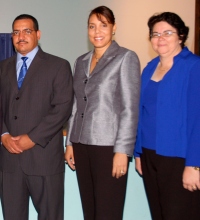Archive for November, 2009

Two arrested for trojan virus that steals bank details
 (BBC): Two suspected computer hackers have been arrested in Manchester in a major inquiry into a global internet scam designed to steal personal details. The trojan program is believed to have infected thousands of computers around the world, said the Metropolitan Police, which is leading the inquiry. A man and woman, both aged 20, have been questioned and bailed until March 2010 pending further inquiries. Police revealed the arrests were the first in Europe as part of the inquiry. The investigation focused on the ZeuS or Zbot trojan – "a sophisticated malicious computer program", said police.
(BBC): Two suspected computer hackers have been arrested in Manchester in a major inquiry into a global internet scam designed to steal personal details. The trojan program is believed to have infected thousands of computers around the world, said the Metropolitan Police, which is leading the inquiry. A man and woman, both aged 20, have been questioned and bailed until March 2010 pending further inquiries. Police revealed the arrests were the first in Europe as part of the inquiry. The investigation focused on the ZeuS or Zbot trojan – "a sophisticated malicious computer program", said police.

Somali woman stoned to death for adultery
 (BBC): A 20-year-old woman divorcee accused of committing adultery in Somalia has been stoned to death by Islamists in front of a crowd of about 200 people. A judge working for the militant group al-Shabab said she had had an affair with an unmarried 29-year-old man. He said she gave birth to a still-born baby and was found guilty of adultery. Her boyfriend was given 100 lashes. According to reports from a small village near the town of Wajid, 250 miles (400km) north-west of the capital, Mogadishu, the woman was taken to the public grounds where she was buried up to her waist. She was then stoned to death in front of the crowds on Tuesday afternoon.
(BBC): A 20-year-old woman divorcee accused of committing adultery in Somalia has been stoned to death by Islamists in front of a crowd of about 200 people. A judge working for the militant group al-Shabab said she had had an affair with an unmarried 29-year-old man. He said she gave birth to a still-born baby and was found guilty of adultery. Her boyfriend was given 100 lashes. According to reports from a small village near the town of Wajid, 250 miles (400km) north-west of the capital, Mogadishu, the woman was taken to the public grounds where she was buried up to her waist. She was then stoned to death in front of the crowds on Tuesday afternoon.

Patients in UK ‘shunning’ swine flu jab
 (msn): More than half of patients are turning down the swine flu vaccine, a snapshot survey has suggested. A Pulse magazine poll of 107 GPs found some people were concerned about possible side-effects of the jab while others believed there was no need to have it because the virus is mild. Family doctors are currently vaccinating people at high risk from swine flu, including pregnant women, health workers and those with asthma, heart disease and diabetes. The poll of GPs in England found resistance to the jab was particularly high among pregnant women and, overall, only 46% of patients offered the vaccine are thought to have said yes.
(msn): More than half of patients are turning down the swine flu vaccine, a snapshot survey has suggested. A Pulse magazine poll of 107 GPs found some people were concerned about possible side-effects of the jab while others believed there was no need to have it because the virus is mild. Family doctors are currently vaccinating people at high risk from swine flu, including pregnant women, health workers and those with asthma, heart disease and diabetes. The poll of GPs in England found resistance to the jab was particularly high among pregnant women and, overall, only 46% of patients offered the vaccine are thought to have said yes.

Bill offers hope for abused
 (CNS): A bill designed to update the existing law and which contains wider protection to women, children, families and other victims from the scourge of domestic abuse will, if it’s passed, offer hope to many who suffer behind closed doors. The consultation period for the new legislation has been extended until the end of November, and officials hope those who have experienced this kind of violence and abuse will add their comments and contributions to ensure the new law will have teeth and protect the vulnerable.
(CNS): A bill designed to update the existing law and which contains wider protection to women, children, families and other victims from the scourge of domestic abuse will, if it’s passed, offer hope to many who suffer behind closed doors. The consultation period for the new legislation has been extended until the end of November, and officials hope those who have experienced this kind of violence and abuse will add their comments and contributions to ensure the new law will have teeth and protect the vulnerable.
The minister with responsibility for gender affairs, Juliana O’Connor-Connolly, welcomed the Protection Against Domestic Violence Bill, 2009 which will repeal the 17-year-old Summary Jurisdiction (Domestic Violence) Law.
“I am encouraging members of the public to give their suggestions and recommendations on this key law, which is only going to strengthen our families and thereby the fabric of our community,” O’Connor-Connolly said. “This is a very important piece of legislation, as it gives social services officers, law enforcement and prosecutors better tools with which to advocate for those affected by domestic violence.”
The bill is currently posted on the GIS website and has been circulated for public discussion by the Law Reform Commission. The discussion period ends on Monday, 30 November, following an extension from the original 20 November deadline.
It defines more specifically what actions constitute domestic violence; details who is protected; defines who is considered a child under the law; types of court orders available; and who may initiate proceedings.
“The expanded definition of what constitutes domestic violence is a major step forward, as it gives broader coverage to victims. We know from experience that domestic violence goes beyond physical abuse,” the minister added. According to the bill, “a person commits an act of domestic violence against a prescribed person where it is proved that his conduct caused or is intended to cause emotional or psychological; financial, physical or sexual abuse.”
Gender affairs policy advisor in the ministry, Tammy Ebanks Bishop explained that the review of this legislation came about as a result of the recommendations contained in the special report on gender violence, which was submitted to Cabinet in December 2008 by a special advisory committee on gender violence. Ebanks Bishop said the various expansions of definitions and provisions being proposed in the new bill aim to provide protection to the most vulnerable people who are, or who may become, victims of domestic violence.
The bill addresses a number of problems presented by the old law such as the constraint of domestic violence to the marital home. Abuse and violence can often occur between couples who no longer reside in the same house but because of child-ties may still spend considerable time together. The new law also takes in consideration the changing definition of family and the more complex modern relationships that exist in today’s reality.
For more information, or to provide feedback on the Protection against Domestic Violence Bill, please visit www.gov.ky.

New options for 16+ students
 (CNS): Students will be taking CXC and GCSE external exams in Year 11 following the Education Ministry’s major restructuring of secondary education next academic year, bringing it inline with the British education system on which the Cayman system is based. However, students’ compulsory schooling will continue for an additional year, in which they can take advanced academic or vocational courses or work training. Currently, students take external exams at the end of Year 12 after 6 years of secondary education, while their UK counterparts take GCSE or equivalent exams after 5 years. (Left: Minister Rolston Anglin, CO Mary Rodrigues and CEO Shirley Wahler)
(CNS): Students will be taking CXC and GCSE external exams in Year 11 following the Education Ministry’s major restructuring of secondary education next academic year, bringing it inline with the British education system on which the Cayman system is based. However, students’ compulsory schooling will continue for an additional year, in which they can take advanced academic or vocational courses or work training. Currently, students take external exams at the end of Year 12 after 6 years of secondary education, while their UK counterparts take GCSE or equivalent exams after 5 years. (Left: Minister Rolston Anglin, CO Mary Rodrigues and CEO Shirley Wahler)
However, it appears that these changes will not be applied to the Cayman Brac High School at this time, though no explanation for this has been given. Brac students will continue to take the bulk of their exams at the end of Year 12 and not benefit from the new offerings of the additional year.
Announcing the changes to be implemented in September 2010, the Education Ministry said the George Hicks Campus, which is currently a middle school, and the John Gray campus, which is currently a high school, will become two “all-through” high schools, catering to students from Years 7- 11 (ages 11 to 16).
A new core curriculum for Years 10 and 11 students studying towards external exams mandates English, mathematics, science, information technology, religious education and social studies, and they will choose a further 3 subjects. According to the ministry, the core subjects “will reflect cultural norms and the need to produce globally competitive citizens.”
The ministry also says that innovative technical subjects available in the two schools on Grand Cayman will include a leisure and tourism option, which is specially designed and accredited for Caymanian students, as well as catering; music technology; and health and social care. These will be offered in addition to already well-established programmes in construction, electrical and electronics and motor vehicles, reflecting a renewed focus on national priorities and the needs of the labour market, the release says.
A mandatory 16+ “bridge year” for students who have completed their CXC/GCSE examinations will also be launched in 2010, the ministry says, and will include a variety of programmes for students at all levels, including technical and vocational options, foundation studies for students who want to improve their readiness for further studies, and will also provide the opportunity for retakes of exams.
The ministry will be introducing Advanced Placement (AP) for academically inclined students, through which they can earn college credit and significant advanced standing for US universities. The 16+ programme is also working towards accreditation for the International Baccalaureate (IB) diploma programme, which, like AP, offers further academic courses and prepares university-bound students but encompasses a more holistic approach to education.
“There will also be largely work-based options for students who would benefit from this training,” noted Chief Officer Mary Rodrigues in the release, adding that many of the programmes will have a substantial real "world of work" element. In addition, students may also opt, as they do now, to pursue different learning opportunities through other providers, including A Levels at local private schools, or studies at UCCI.
Also planned are enhanced arrangements for career guidance, assessment and counselling support. A careers advisory service will be developed, with expertise to be shared throughout all phases of the government education service. Expert career advisers will help students in their earlier high-school years with academic and potential career choices, and later work with them on appropriate 16+ options.
Chief Education Officer Shirley Wahler strongly endorsed the restructuring process. “This is a significant and long-awaited step forward for education in theCayman Islands. The move to all-through Year 7 – 11 schools will provide young people with better continuity, and an improved learning environment,” she said.
“In addition, the introduction of the 16+ programmes allows us to provide targeted and relevant career and technical preparation for the workplace, while also nurturing the academic potential of our students. We believe that this programme will help us to develop a strong body of future citizens and leaders for the Cayman Islands.”
Cayman schools have already seen improvements in external exam results: last year around 36% of students at John Gray students achieved five or more high-level passes, up from 27% the year before and a record for the school. At the Cayman Brac High School 56% (22 out of 39) of the graduating class gained 5 or more high level passes and 36% gained 7 or more.
With most of the news about education focused on the drama surrounding the construction of the two new schools, Education Minister Rolston Anglin noted the urgency of separating that and the much-needed academic improvements in secondary education.
“Education reform cannot be held to ransom by contractor disputes on buildings,” he said. “Reform is ultimately about enhancements to teaching and learning; the curriculum; and students’ social and personal development. There is much that we can do come September 2010 to introduce significant reforms that will benefit our children in our current school sites. Acting now will also ease uncertainties for all stakeholders, and allow for an easy transition once the new schools are completed.”
Chief Officer Rodrigues said a ministry-appointed New Schools Transition Committee, with representatives from the Department of Education Services, the Educational Standards and Assessment Unit, and the ministry, is busy completing consultations and plans. The committee will provide regular updates on the developments in the coming weeks.
“Given the uncertainties, the group has the difficult task of planning for a range of scenarios: the delivery of one new high school, two new schools, or no schools at all,” Rodrigues explained. “With the Minister’s clear direction, the group is now focusing on the developments that will be rolled out for a September 2010 start, no matter what pertains in relation to the new buildings.”

Scientists say world on course for catastrophic 6° rise
 (Independent): The world is now firmly on course for the worst-case scenario in terms of climate change, with average global temperatures rising by up to 6C by the end of the century, leading scientists said yesterday. Such a rise – which would be much higher nearer the poles – would have cataclysmic and irreversible consequences for the Earth, making large parts of the planet uninhabitable and threatening the basis of human civilisation. We are headed for it, the scientists said, because the carbon dioxide emissions from industry, transport and deforestation which are responsible for warming the atmosphere have increased dramatically since 2002, in a way which no one anticipated, and are now running at treble the annual rate of the 1990s.
(Independent): The world is now firmly on course for the worst-case scenario in terms of climate change, with average global temperatures rising by up to 6C by the end of the century, leading scientists said yesterday. Such a rise – which would be much higher nearer the poles – would have cataclysmic and irreversible consequences for the Earth, making large parts of the planet uninhabitable and threatening the basis of human civilisation. We are headed for it, the scientists said, because the carbon dioxide emissions from industry, transport and deforestation which are responsible for warming the atmosphere have increased dramatically since 2002, in a way which no one anticipated, and are now running at treble the annual rate of the 1990s.

Ogier to come of age at Camana Bay
(CNS): Local offshore law firm and fiduciary services provider Ogier will be celebrating its 18th birthday on Wednesday 18 November as well as formally announcing the move to its new home at Camana Bay. Despite the challenging economic times, Ogier said it has experienced significant growth in a number of the firm’s teams, especially its Litigation and Restructuring & Insolvency team under the leadership of Chris Russell and Ogier Fiduciary Services (Cayman) Limited under Balan Murugesu.
“The face of Ogier has changed over the years,” said law firm managing partner James Bergstrom. “We are a firm offering integrated legal and fiduciary services and have significant and increasing strength across our core practice areas of banking and finance, investment funds, litigation, and private client and trusts.”
This invitation only cocktail reception will be held on the dock-side of 89 Nexus Way starting at 5:30 pm and will feature brief remarks by dignitaries and local entertainment.
CFATF meets in Cayman to discuss policy
(CNS): Representatives from the Caribbean Financial Action Task Force (CFATF) and the Financial Action Task Force (FATF) are visiting the Cayman Islands this week, but not on this occasion to put the jurisdiction’s regulations and standards under the spotlight. This time the government is hosting a three-day joint typologies meeting featuring policy makers and experts from the two groups, where the challenges facing the organisations will be discussed with local financial experts. McKeeva Bush, the premier and finance minister, said it was a significant event for Cayman.
“As CFATFco-chair, the Cayman Islands is delighted to host this event,” Bush said. “In the financial industry, the CFATF/FATF guidelines are considered one of the most recognised set of regulatory standards, and this meeting is a testament of CFATF’s commitment to keep abreast of the latest trends and challenges in the fight against financial crime.”
The three-day event will start on Wednesday, 18 November, and will take place at the Ritz Carlton Grand Cayman Resort. The meetings will consist of a series of workshops and roundtables, where delegates will discuss challenges facing the organisation in the areas of money laundering and terrorist financing. Critical topics include trends and indicators, policy and global threat assessment (financial crisis), as well as operational issues.
As a founding member of the CFATF, Cayman will be represented by government’s financial sector, including the Cayman Islands Monetary Authority, Financial Reporting Authority, Portfolio of Legal Affairs and the Attorney General’s Office.
The premier, who is expected to return from his overseas trip promoting the Cayman Islands financial services this evening, will be giving the opening remarks at the start of the meeting on Wednesday morning.

UK falls in corruption league table to an all-time low
 (Daily Telegraph): The annual “corruption index” from Transparency International – which has been published since 1995 – found that Britain had slipped to 17th out of 180 countries. The UK is now more corrupt than countries like Japan, Hong Kong, Luxembourg and Austria. Transparency International gave the UK a Corruption Perceptions Index (CPI) score of 7.7. Before 2008, the UK’s score had never slipped below 8. The non-governmental organisation, which is based in Berlin, blamed the poor showing on a collapse in confidence in politicians triggered by revelations about MPs’ expenses.
(Daily Telegraph): The annual “corruption index” from Transparency International – which has been published since 1995 – found that Britain had slipped to 17th out of 180 countries. The UK is now more corrupt than countries like Japan, Hong Kong, Luxembourg and Austria. Transparency International gave the UK a Corruption Perceptions Index (CPI) score of 7.7. Before 2008, the UK’s score had never slipped below 8. The non-governmental organisation, which is based in Berlin, blamed the poor showing on a collapse in confidence in politicians triggered by revelations about MPs’ expenses.
NB: The listing does not include overseas territories

‘CIG can’t afford schools’ TJI
 (CNS): The general contractor of the two high school projects has hit out at the previous government, saying the schools were part of a spending spree that was ill-conceived, poorly executed, over-indulgent, and insufficiently funded. Tom Jones International Ltd (TJI) said government has never had the resources to build the schools and what resources it did have, it managed poorly. Following his second work stoppage last week, the contractor said he has walked off the job because the new government has offered no evidence that it can afford to complete the projects.
(CNS): The general contractor of the two high school projects has hit out at the previous government, saying the schools were part of a spending spree that was ill-conceived, poorly executed, over-indulgent, and insufficiently funded. Tom Jones International Ltd (TJI) said government has never had the resources to build the schools and what resources it did have, it managed poorly. Following his second work stoppage last week, the contractor said he has walked off the job because the new government has offered no evidence that it can afford to complete the projects.
In a long statement TJI has said it regretted suspending work at the John Gray and Clifton Hunter sites, but despite efforts over the last six weeks to resolve the issues surrounding outstanding payments, no solution has been forthcoming.
“At the heart of the issue is government’s ability — or lack thereof — to pay for the work,” TJI said in the statement. “While the government has continually stated that it has budgeted funds to complete the projects, a line item in a budget, in practical financial terms, means nothing.”
TJI said that the government’s recent record of budget projections had been wildly inaccurate, and therefore the contractor was exercising its rights under the contract to ask government to provide a trust or a payment bond to demonstrate it has the financial wherewithal to complete the schools. “Government has steadfastly refused to provide such assurances,” the contractor stated.
Although the education minister said last week that the two sides were heading towards an agreement regarding future payment advances, before the stoppage, TJI said there was never an agreement in principle to the latest proposed funding arrangement.
“Verbal discussions touched on an agreement for the advance payments, which would have been acceptable to TJI, but the government then drafted an agreement that sought to change the terms of the original contract. These changes would have forced TJI to relinquish many of its contractual rights in order to obtain the payment from the government that was already due.”
Contrary to Education Minister Rolston Anglin’s comments last week that the contractor was attempting to hold the country to ransom, TJI said it was the cheque it was due that was being “held hostage” and the “ransom” was a "surrender of rights already agreed to by government in the original contract it signed.”
In the statement, the contractor said that to date the Ministry of Education had made more than 85 significant changes to the original plans, and claimed they increased the costs byCI$17 million.
“The ministry never budgeted any funds for these changes or any other contingencies including the furniture and fixtures,” the statement said. “TJI bid on one project and is being asked to build quite another, one that is far more costly.”
The contractor also lamented the lack of a project manager throughout the development of the schools. The previous administration’s manager left before the “first shovelful of dirt was scooped from the earth", TJI stated. “The consequence of this has been catastrophic both to the government treasury and the projects.”
The firm went on to say that TJI spent dozens of hours negotiating, explaining, and trying to educate the Education Ministry (notably former Minister Alden McLaughlin, Chief Officer Angela Martins, and advisor Vaughn Carter) on the timeline and cost consequences of their decisions.
“More than 12 months since construction first began on the two sites, government finally appointed another project manager, David Benoit, to oversee the construction,” TJI added, saying it looked forward to working with him and completing these projects under the explicit terms of its contract with government.